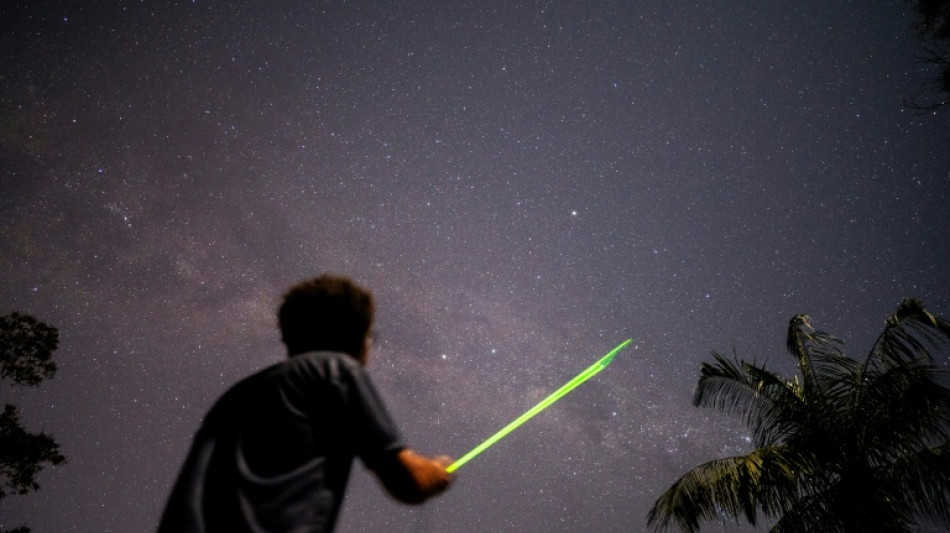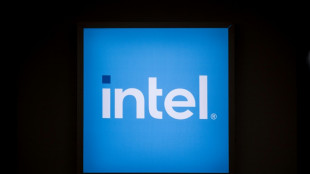
-
 Indian army says new exchange of gunfire with Pakistan
Indian army says new exchange of gunfire with Pakistan
-
Epstein accuser Virginia Giuffre takes own life in Australia: family

-
 Hundreds of buildings damaged, dozens injured in 6.3 Ecuador quake
Hundreds of buildings damaged, dozens injured in 6.3 Ecuador quake
-
India and Pakistan's Kashmir fallout hits economy too

-
 Francis's funeral to be grand farewell to 'pope of the poor'
Francis's funeral to be grand farewell to 'pope of the poor'
-
Pogacar faces defiant Evenepoel at Liege-Bastogne-Liege

-
 Chelsea eye great escape against Barcelona in Women's Champions League
Chelsea eye great escape against Barcelona in Women's Champions League
-
Iran, US to hold new round of high-level nuclear talks

-
 'Energy and effort' pay off for Reds as Blues' woes continue
'Energy and effort' pay off for Reds as Blues' woes continue
-
Albatross and closing birdie lift China's Liu to LPGA Chevron lead

-
 On the horizon? Wave of momentum for high seas treaty
On the horizon? Wave of momentum for high seas treaty
-
Developing countries should fast-track US trade deals: World Bank president

-
 Grizzlies' Morant 'doubtful' for must-win game 4 v Thunder
Grizzlies' Morant 'doubtful' for must-win game 4 v Thunder
-
Trump in Rome for pope funeral in first foreign trip of new term

-
 Trump says Russia-Ukraine deal 'very close' after new Kremlin talks
Trump says Russia-Ukraine deal 'very close' after new Kremlin talks
-
US rookies lead PGA pairs event with McIlroy and Lowry in hunt

-
 Trump tariff promises get a reality check
Trump tariff promises get a reality check
-
Warriors coach Kerr 'relatively optimistic' injured Butler will play game 3

-
 Postecoglou hopes 'Stonecutter's Credo' can inspire Spurs
Postecoglou hopes 'Stonecutter's Credo' can inspire Spurs
-
PSG lose unbeaten Ligue 1 record ahead of Arsenal showdown

-
 Venezuela accuses El Salvador president of 'human trafficking'
Venezuela accuses El Salvador president of 'human trafficking'
-
Own goal takes Sundowns to African final against Pyramids

-
 Scores of buildings damaged, 20 injured in Ecuador quake
Scores of buildings damaged, 20 injured in Ecuador quake
-
US stocks extend rally as market eyes busy calendar next week

-
 Pope's death triggers surge of disinformation he fought against
Pope's death triggers surge of disinformation he fought against
-
Rovanpera takes control of Rally Islas Canarias

-
 Zelensky insists Crimea is Ukrainian as US envoy meets Putin
Zelensky insists Crimea is Ukrainian as US envoy meets Putin
-
Patel and Mendis help Sunrisers beat Kings in Dhoni's 400th T20

-
 Copa del Rey ref statements 'unacceptable': Real Madrid after boycotting final build-up
Copa del Rey ref statements 'unacceptable': Real Madrid after boycotting final build-up
-
Insurance CEO's accused killer pleads not guilty to federal murder charges

-
 FBI arrests Wisconsin judge for shielding undocumented migrant
FBI arrests Wisconsin judge for shielding undocumented migrant
-
Brazil ex-president Collor de Mello jailed for corruption

-
 Zelensky insists Crimea 'belongs' to Ukraine as US envoy meets Putin
Zelensky insists Crimea 'belongs' to Ukraine as US envoy meets Putin
-
Real Madrid boycott Copa del Rey build-up over referee complaints

-
 Trinidad and Tobago votes for parliament, PM, with opposition in lead
Trinidad and Tobago votes for parliament, PM, with opposition in lead
-
IMF chief hails 'constructive' Spring Meetings held under tariff uncertainty

-
 Iran FM Araghchi in Oman ahead of nuclear talks with US
Iran FM Araghchi in Oman ahead of nuclear talks with US
-
Dozens of buildings destroyed, 20 injured in Ecuador quake

-
 Young Barca must 'enjoy' Real Madrid Copa final fight: Flick
Young Barca must 'enjoy' Real Madrid Copa final fight: Flick
-
Pakistan and India border closure separates families

-
 Brazil's Bolsonaro 'stable' after post-surgery setback
Brazil's Bolsonaro 'stable' after post-surgery setback
-
Catholics in secular Cuba hail Francis as 'bridge'

-
 US envoy Witkoff, Putin discuss 'possibility' of direct Russia-Ukraine talks
US envoy Witkoff, Putin discuss 'possibility' of direct Russia-Ukraine talks
-
Community seeks answers after French school knife killing

-
 German prosecutors seek jail terms in VW 'dieselgate' trial
German prosecutors seek jail terms in VW 'dieselgate' trial
-
Sabalenka makes winning start at Madrid Open

-
 EU, US should de-escalate and negotiate trade deal: IMF Europe director
EU, US should de-escalate and negotiate trade deal: IMF Europe director
-
Russia accuses Ukraine of killing general in car bombing

-
 Emery wants FA Cup glory and Champions League berth for Villa
Emery wants FA Cup glory and Champions League berth for Villa
-
Buildings destroyed, one injured in Ecuador quake


In Brazil, stargazers escape cities in search of 'astro-tourism'
Awestruck by the oranges and blues of the Jewel Box star cluster, part of the Southern Cross constellation, Pedro Froes manages to get out a few words: "It's incredible."
Froes is viewing the stars from a telescope in Desengano State Park, a rural patch of Brazil largely spared from light pollution, located some 260 kilometers (160 miles) north of Rio de Janeiro.
Desengano is Latin America's first "International Dark Sky Park," as designated by the global light pollution tracker DarkSky. And Froes is one of the park's growing number of "astro-tourists," drawn there by its isolation from cities and the light they spew into the night sky.
"From here you can see 3,000 stars a year with the naked eye, without the help of an instrument," says astronomer Daniel Mello, from the Valongo Observatory at the Federal University of Rio de Janeiro.
"In cities like Rio or Sao Paulo, at most, you can see 200 a year."
In the front garden of the park's headquarters, located in the small town of Santa Maria Madalena, Mello conducts a public observation session in front of about 20 people, pointing with a laser to the Southern Cross, Scorpio and Centaurus constellations.
The evening is part of a project created by Mello and a group of specialists in tourism, ecology and photography.
The nearest big city is 120 kilometers away, protecting the park -- replete with vegetation, forest and mountains -- from artificial light.
That means the Milky Way is visible to the naked eye even on moonlit nights. Two telescopes provide views of more distant stars.
"I always liked to admire the sky, but I rarely had the opportunity to see it like here," says Froes, a 22-year-old biologist from Niteroi, a city near Rio.
- Annual star festival -
Some 80 percent of people on Earth sleep under night skies polluted by artificial light, the consequence of modernization and urbanization.
But beyond clouding out the stars, light pollution also has negative environmental effects -- leading to restless humans and disoriented migratory birds, and causing reproductive issues for other species.
In Latin America, the only other area recognized by DarkSky is in Chile's Elqui Valley, classified as a "sanctuary."
Unlike in Chile, Europe or the United States, astro-tourism is still in its infancy in Brazil.
But more and more stargazers have been trekking to Santa Maria Madalena, "especially in the last six months," says Nelson Saraiva. He runs one of the few hotels in the town of 10,000, where most people are farmers.
Saraiva, a retired teacher, is convinced astro-tourism can become a huge economic boon for the community. Beyond Mello's observation sessions, there are also monthly gatherings that mix astronomy and gastronomy.
The government and local entrepreneurs have banded together to organize a star festival to take advantage of growing tourist interest. The first festival was organized last September, with plans in place this fall for what's shaping up to be an annual tradition.
- Ecological equilibrium -
To obtain certification from DarkSky, Desengano park also had to commit to promoting environmental education, as well as using low-impact lighting.
Those sorts of moves are good for the sky, but also have down-to-Earth implications felt closer to home.
"We have an enormous diversity of birds, mammals, and reptiles which are here only because the place is preserved," says park research manager and biologist Carlota Enrici.
"Reducing light pollution keeps the ecosystem in balance."
Mello, the astronomer, hopes other places in Brazil can follow Desengano's model, which would not only expand tourism but also "rescue people's contact with the starry sky and with nature."
O.Karlsson--AMWN



